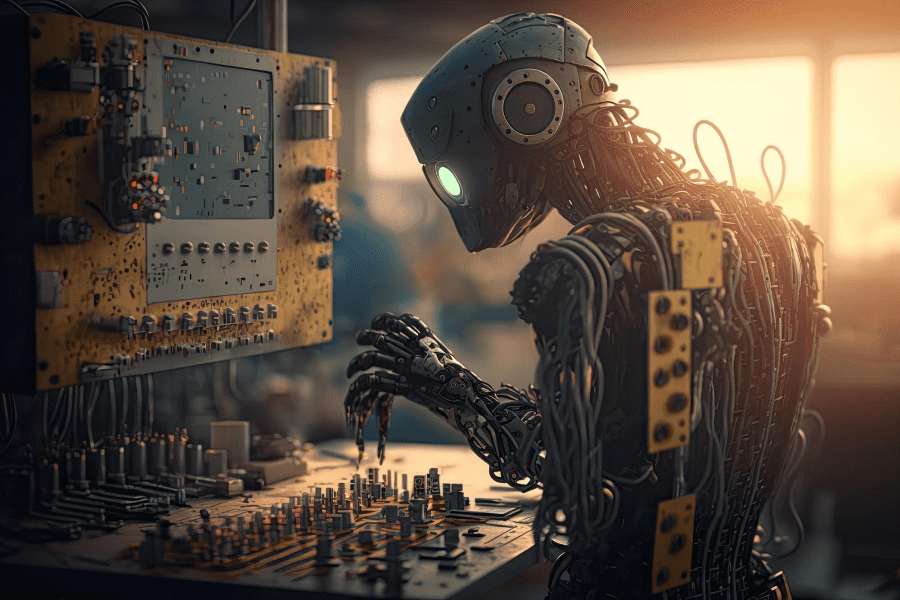The rapid advancement of artificial intelligence (AI) in recent years has generated both excitement and apprehension about the consequences of increasingly sophisticated generative AI systems. This article explores the possibilities, challenges, and safeguards surrounding generative AI taking over humanity while delving into the current state of AI in business.
Table of Contents
- The Rise of Generative AI
- The Positive Impacts
- The Ethical Dilemmas
- Prospects of Generative AI Dominating the World
- Potential Scenarios of AI Assuming Global Control
- Why the Domination of Humanity by Artificial Intelligence Seems Unlikely
- Landscape of Artificial Intelligence in Business
- Conclusion
- Frequently Asked Questions
The Rise of Generative AI
Generative AI is a system that can autonomously produce content, such as text, images, and even entire art pieces, without direct human input. This technology has made significant strides thanks to deep learning models like GPT-3, which can understand and generate human-like text with remarkable coherence and context awareness. As generative AI advances, its applications span diverse fields, from creative endeavors to problem-solving in complex domains.
The Positive Impacts
The potential of generative AI to boost human creativity and productivity is among its most exciting features. In fields like content creation, journalism, and design, generative AI can assist and augment human efforts, generating high-quality, contextually relevant content at an unprecedented scale. Moreover, in scientific research and data analysis, generative AI can accelerate the pace of discovery by automating tedious tasks and providing valuable insights.
Furthermore, generative AI has the potential to democratize access to information and services. Linguistic translation, for example, can be substantially enhanced, breaking down linguistic boundaries and promoting global contact. AI-generated personalized treatment plans based on genetic profiles could revolutionize the field and improve patient outcomes.
The Ethical Dilemmas
However, the ascent of generative AI also raises ethical concerns that cannot be ignored. As these systems become more sophisticated, issues related to misinformation, deepfakes, and manipulating public opinion emerge. The ability of generative AI to produce realistic but entirely fabricated content poses a significant threat to the trustworthiness of information sources, potentially leading to widespread confusion and distrust in various domains.
Privacy is another critical concern. The vast amounts of data required to train generative AI models raise questions about data ownership, consent, and potential misuse. Governments, organizations, and individuals must grapple with establishing robust regulations and safeguards to protect privacy rights and prevent the abuse of generative AI technology for malicious purposes.
Prospects of Generative AI Dominating the World
Ethical and Regulatory Frameworks
Societal awareness of the ethical implications of AI is on the rise. Governments and organizations are developing robust regulatory frameworks to ensure responsible AI development and deployment. The focus is not merely on technological innovation but also on establishing ethical standards that align with human values.
Human Oversight
A critical aspect that mitigates the potential of AI ruling the world is the necessity for human oversight. Despite the increasing autonomy of AI systems, human intervention remains paramount. Humans play a crucial role in setting goals, defining values, and ensuring that AI aligns with humanity’s best interests.
Lack of Consciousness
One fundamental limitation that prevents AI from “ruling the world” in the manner often depicted in fiction is its lack of consciousness and self-awareness. AI operates based on pre-defined algorithms and data, lacking proper understanding or intentionality. The absence of consciousness limits AI’s ability to make overarching decisions about humanity’s fate autonomously.
Interdisciplinary Collaboration
AI development is a complex process that involves collaboration across various fields, including computer science, ethics, law, and sociology. This interdisciplinary approach ensures that AI is developed with a well-rounded understanding of its societal impact. It also facilitates the integration of diverse perspectives to address the multifaceted challenges associated with AI development.
Potential Scenarios of AI Assuming Global Control
Unintended Consequences
AI systems may display unforeseen behavior if not carefully built and managed. Biases in data or incorrect algorithms can result in unfavorable results. Addressing these challenges is critical to avoiding unintended negative repercussions that could allow AI to wield disproportionate power.
Security Concerns
The security hazards connected with AI systems are a significant concern. This emphasizes the importance of implementing effective cybersecurity measures to prevent illegal access and manipulation. Protecting AI systems from external attacks is critical for avoiding unforeseen consequences such as AI taking control.
Dependency and Job Displacement
Widespread automation driven by AI could result in economic and societal disruptions. The risk of dependency on AI raises concerns about job markets and the creation of social inequalities. To prevent adverse consequences, managing the transition to automation carefully is essential, ensuring a balance between technological advancement and societal well-being.
Why the Domination of Humanity by Artificial Intelligence Seems Unlikely
Control Mechanisms
There is a growing emphasis on incorporating control mechanisms into AI systems. Fail-safe mechanisms, transparency, and accountability are prioritized to prevent AI from exceeding its intended functions. The ongoing research and development in AI ethics aim to create controllable systems that align with human values.
Public Awareness and Discourse
The increased awareness of AI’s capabilities and risks among the general public contributes to responsible development. Open debate and public discourse are critical in guiding AI research and implementation. This collective awareness acts as a check against the undue concentration of power in the hands of a few.
Legal and Ethical Safeguards
Legal and ethical safeguards are being actively developed to ensure responsible AI development. These safeguards are designed to establish guidelines that prioritize human well-being and prevent misuse of AI technology. Regulatory bodies are working to create a framework that ensures the ethical use of AI across various sectors.
Landscape of Artificial Intelligence in Business
Automation and Efficiency
AI is increasingly finding applications in business, particularly in automation, improving efficiency and facilitating data-driven decision-making. The potential for AI to enhance productivity across various industries is evident, with companies leveraging AI to streamline operations.
Enhanced Decision-Making
AI algorithms, equipped to analyze vast datasets, provide valuable insights that aid businesses in making informed decisions. The analytical capabilities of AI contribute to strategic planning and optimize decision-making processes.
Challenges and Risks
However, the integration of AI in business is challenging. Ethical considerations, data privacy concerns, and potential biases in AI systems pose significant hazards. Companies must navigate these challenges to ensure the responsible and effective implementation of AI technologies.
Find the best AI companies for your business, Headquarter Location
Conclusion
In conclusion, while the notion of generative AI ruling the world captures the imagination and stirs debates, a nuanced understanding reveals a landscape of checks and balances. Ethical considerations, regulatory frameworks, and human oversight are pivotal in shaping the trajectory of AI development. The challenges and risks associated with AI must be addressed, particularly in the context of business applications, to ensure a future where AI serves humanity responsibly and ethically. The ongoing dialogue and collaboration across disciplines will play a crucial role in steering the course of AI development towards a positive and beneficial future for humanity.
Frequently Asked Questions
What is Generative AI?
Generative AI is a form of artificial intelligence technology that can generate creative outputs often indistinguishable from human results.
How is Generative AI used in healthcare?
Generative AI in healthcare aids in diagnostics, drug discovery, and personalized treatment plans, enhancing overall patient care.
Are there concerns about job displacement due to AI?
While AI may automate specific tasks, it creates new job opportunities and enhances human productivity in various sectors.
What measures are in place to address ethical concerns?
Governments and organizations are actively working on establishing robust regulations and ethical frameworks to guide AI development and deployment.
Can Generative AI truly understand emotions?
Advancements in emotional intelligence algorithms enable Generative AI to better perceive and respond to human emotions.
How can society ensure ethical AI practices?
Promoting awareness, advocating for transparent AI development, and fostering interdisciplinary collaborations are vital to ensuring ethical AI practices.


